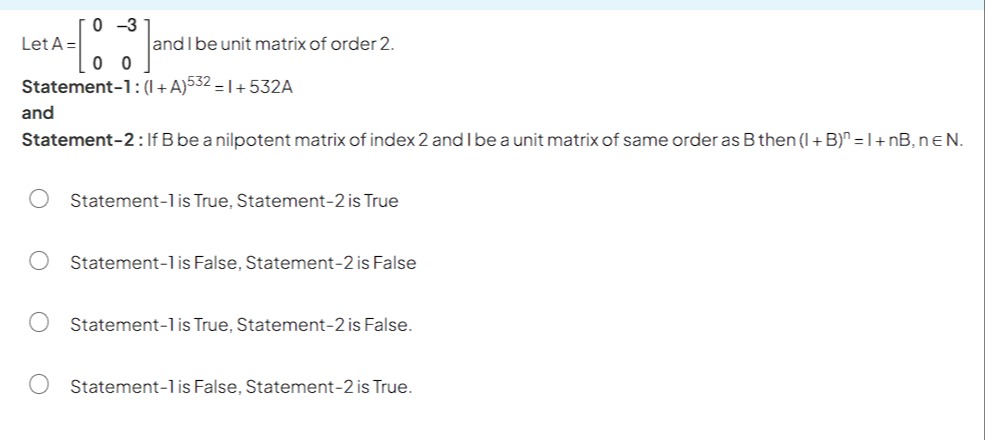Question
Question: Let \(A = \begin{bmatrix} 0 & -3 \\ 0 & 0 \end{bmatrix}\) and I be unit matrix of order 2. Statemen...
Let A=[00−30] and I be unit matrix of order 2.
Statement-1: (I+A)532=I+532A and
Statement-2: If B be a nilpotent matrix of index 2 and I be a unit matrix of same order as B then (I+B)n=I+nB,n∈N.

Statement-1 is True, Statement-2 is True
Statement-1 is False, Statement-2 is False
Statement-1 is True, Statement-2 is False.
Statement-1 is False, Statement-2 is True.
Statement-1 is True, Statement-2 is True
Solution
Statement-1:
We are given the matrix A=[00−30] and the identity matrix I=[1001]. We need to check if (I+A)532=I+532A.
First, let's calculate I+A: I+A=[1001]+[00−30]=[10−31].
Let's calculate the powers of (I+A): (I+A)1=[10−31] (I+A)2=[10−31][10−31]=[10−61] (I+A)3=[10−61][10−31]=[10−91]
By observing the pattern, it appears that (I+A)n=[10−3n1] for any positive integer n.
For n=532, we have (I+A)532=[10−3⋅5321]=[10−15961].
Now let's calculate I+532A: I+532A=[1001]+532[00−30]=[1001]+[00−15960]=[10−15961].
Since (I+A)532=[10−15961] and I+532A=[10−15961], Statement-1 is True.
Statement-2:
We are given that B is a nilpotent matrix of index 2, which means B=0 and B2=0. We need to check if (I+B)n=I+nB for n∈N.
Since I is the identity matrix, it commutes with any matrix B of the same order, i.e., IB=BI. Therefore, we can use the binomial expansion for matrices:
(I+B)n=(0n)InB0+(1n)In−1B1+(2n)In−2B2+(3n)In−3B3+⋯+(nn)I0Bn.
Since B2=0, it follows that B3=B2B=0⋅B=0, B4=B3B=0⋅B=0, and so on. Thus, Bk=0 for all k≥2.
The binomial expansion simplifies to: (I+B)n=(0n)I+(1n)B+(2n)⋅0+(3n)⋅0+⋯+(nn)⋅0 (I+B)n=1⋅I+n⋅B (I+B)n=I+nB.
This formula holds for any natural number n. Therefore, Statement-2 is True.
Both Statement-1 and Statement-2 are true. Note that the matrix A in Statement-1 is a nilpotent matrix of index 2, since A2=[00−30][00−30]=[0000] and A=0. Statement-1 is a specific instance of the general result given in Statement-2, for B=A and n=532.
